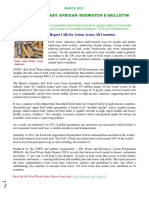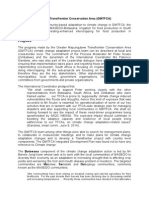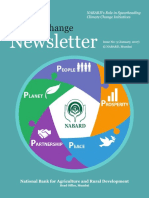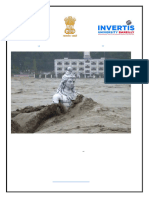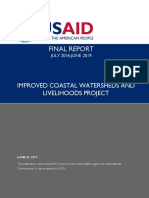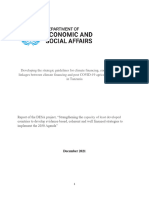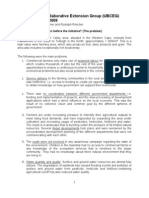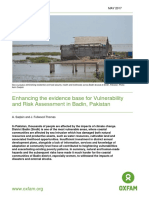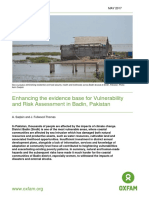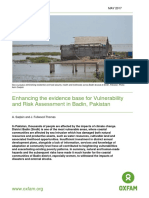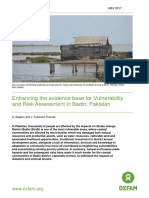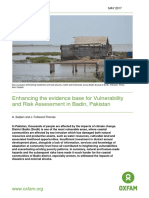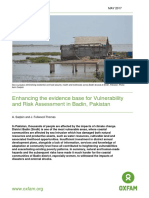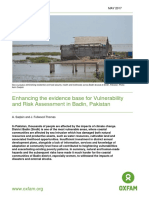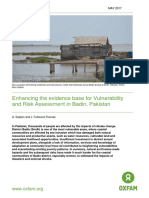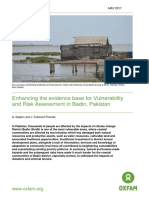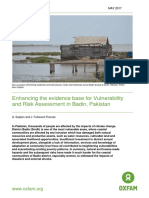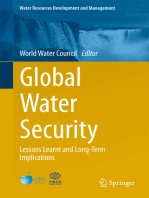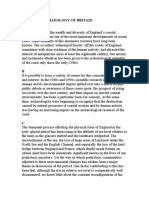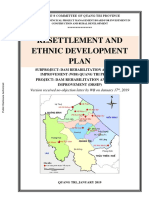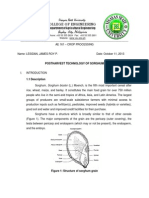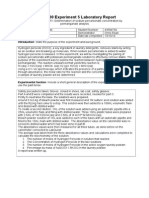Wash Connector Issue 51
Wash Connector Issue 51
Uploaded by
ZinzileCopyright:
Available Formats
Wash Connector Issue 51
Wash Connector Issue 51
Uploaded by
ZinzileOriginal Title
Copyright
Available Formats
Share this document
Did you find this document useful?
Is this content inappropriate?
Copyright:
Available Formats
Wash Connector Issue 51
Wash Connector Issue 51
Uploaded by
ZinzileCopyright:
Available Formats
JANUARY 2017
Inside This Issue...
Editor’s Note
Honourable Minister of Environment,
Water and Climate meets UNICEF’s New
Country Resident Representative
Recognising Sanitation and Hygiene
through National Commemorations
Zimbabwe Handwashing Campaign
Alliance: Saving lives with water and soap
WASH Wizards: Breaking the male
dominated artisanal field, changing the
lives of women
Sanitation for success: Bridging the
gap between communities and service
providers
Upgrade design and operation of a
Municipal Solid Waste Landfill
Diversification contributes to the
success of Gwanda North Community
Health Clubs
SIRDC working with RDCs to create
multi-sectoral GIS systems
C-WASH Project for Lasting and
Inclusive Water and Sanitation Facilities
Water: A Human Right or a Lucrative
Business?
New sustainable, inclusive, zero waste
technology to treat gray water, industrial
effluent and sewage
DISCLAIMER: Any views or opinions
presented in this newsletter are solely
those of the authors and do not necessarily
represent those of the Zimbabwe WASH
sector management body, the National
Action Committee (NAC) Secretariat the
National Coordination Unit (NCU) and its
supporting partners; SNV Netherlands
Development Organisation and UNICEF.
II WASH Connector Newsletter. ISSUE 5
Editor’s Note
It
is another new year again and I wish you all a fruitful and prosperous 2017. The Editorial
Team would like to thank you all for your positive support during the course of 2016 and
is happy to announce launch of the 5th edition of the WASH Connector Newsletter. The
year 2016 was loaded with a number of strategic, high impact and life changing developments
which include the unveiling of a national WASH Sector Humanitarian Response Plan (HRP) against
the current El-Nino-La Nina induced drought and development of the WASH Sector National
Sanitation and Hygiene Policy.
The Government also successfully launched two national strategic documents for the WASH
Sector viz The Monitoring & Evaluation and Learning Framework and The Sanitation & Hygiene
Advocacy Strategy. The 2016/17 Global Analysis and Assessment of Sanitation and Drinking
Water (GLAAS) report with a financial focus was also finalised.
Two major sector development projects namely the 14 Small Towns WASH Programme and the
33 Districts Rural WASH Project were also successfully rounded up and formally handed over to
Government. The Rural WASH Project was also further extended to cover the three remaining
Provinces of Mashonaland East, Mashonaland Central and Manicaland. These development
activities together with many others kept us busy throughout the year. As such, the sector
performed very well and we applaud all our partners for a job well done.
Having realised these gains from 2016, the New Year started on a sad note with an unexpected
Typhoid outbreak in Mbare. To date, Harare City has reported more than 500 suspected cases
since the 13th of October 2016, 45 of which have so far tested positive with 3 deaths. A National
Rapid Response Team has been set put to try and quell further spread of the disease inlight of the
current rainy season characterised by heavy down pours across all the 10 Provinces.
Together we can stop the spread of typhoid!
I strongly believe and hope that we are ready for the New Year, new challenges and new
possibilities. Let us all put our hands together and serve our nation ensuring universal access to
clean-safe water and dignified sanitation thereby reducing the disease burdens associated with
their neglect.
We wish you inspired reading.
Dhoba Lovemore
WASH Information Officer,
National Coordination Unit
Dhoba Lovemore
WASH Connector
Editorial Team
Kevin Mazorodze Carl Mateta
Angella Kabira Tafadzwa Shumba
Matthew Chirambamhanda
WASH Connector Newsletter. ISSUE 5 1
Honourable Minister of Environment, Water and Climate
meets UNICEF’s New Country Resident Representative
By Dhoba Lovemore, National Coordination Unit This system is currently being used to track
severity of the El Nino-La Nina induced drought.
In preparation for a new financial year There is also need to continue formulating new
and as a tactical move to open doors wide strategies able to withstand current climate
for strategic engagements, the Minister change challenges. Of major scrutiny was the
responsible for Environment, Water and issue of boreholes equipped with hand pumps.
Climate, Hon O. C. Z. Muchinguri-Kashiri (MP) The unrelenting recession of ground water
had a round table discussion with UNICEF’s table in direct response to climate change has
new Country Representative Dr. Mohamed Ag a net effect on water availability and access by
Ayoya. The meeting held at Kaguvi Building on communities.
the 13th of December 2016 was also attended
by the Permanent Secretary in the Ministry of It was sweet to the ears hearing the Hon.
Environment, Mr. P Mupazviriho, the National Minister tabling technical solutions to technical
Coordinator in the National Coordination challenges bedevilling the sector in the face of
Unit Mr. H.R Mashingaidze and UNICEF’s climate change. Most interesting from her pool
Chief of WASH, Mr. V. Kinyanjui. In her of solutions was further deepening of already
opening remarks, the Hon. Minister expressed existing boreholes where there is evidence
dismay over the sector’s level of disaster of receding water table and for high yielding
preparedness which she said still remains boreholes, equip those with solar powered
on the reactive side resulting in unnecessary pumps and pipe water to follow communities.
loss of human life. She underscored that our This is also with some background that over
programming for 2017 should seek to reverse usage of hand pumps has resulted in frequent
this status quo and strive to reduce the impact breakdowns many of which are beyond the
of any future disasters affecting the sector. capacity of user communities to finance. More
often than not, this has resulted in long down
time of water points forcing communities back
As if to allay the Hon. Minister’s fears, the to traditional sources.
National Coordinator Mr. Mashingaidze apprised
the meeting that the Rural WASH Sub-Sector Dr. Mohamed Ag Ayoya was quick to point
has long since been put on a national real time out that, the current drought is a major cause
monitoring system able to report on the water for concern to UNICEF’s current and future
and sanitation situation across communities. programming. The Climate change office within
UNICEF is currently in the
process of mobilising resources
for a national programme
in response to the current
climate change challenges.
With immediate effect, the
Rural WASH Project has been
extended to the three provinces
of Manicaland, Mashonaland
East and Mashonaland Central
High Level Discussion: (From left) National Coordinator for National Coordination reaching out to more than
Unit Mr. H.R Mashingaidze, Environment, Water and Climate Minister 1.4m people. This is backed by
Hon O. C. Z. Muchinguri-Kashiri, Permanent Secretary in the Ministry of
Environment Mr. P. Mupazviriho, Hon. Minister’s Aid Mr. S. Karimanzira, £12 million grant from DFID.
UNICEF Country Representative Dr. Mohamed Ag Ayoya and UNICEF Chief of Plans are also at an advanced
WASH, Mr. V. Kinyanjui during the round table discussion at Kaguvi Building on
the 13th of December 2016
stage to commission a national
2 WASH Connector Newsletter. ISSUE 5
Honourable Minister of Environment, Water and Climate
meets UNICEF’s New Country Resident Representative
programme for rehabilitation of community urban areas as Local Authorities’ capacity to
managed piped water schemes. This started collect waste continue to decline to unparalleled
with a national technical assessment of all levels. This calls for behaviour change on the
community managed piped water schemes part of residence generating the waste and is
strewn across the country. UNICEF is proposing only possible through heightening and focusing
a system where the more than 500 schemes hygiene promotion whilst instituting measures
assessed are rehabilitated and have their varied sound enough to make compliance binding and
pumping mechanisms converted to solar with compulsory on both parties. UNICEF Resident
reduced operational costs. Representative gave a practical example of
Iran where Government has worked through
“…boreholes are drying up but why are we school children enforcing the anti litter
continuing with borehole drilling?” asked Dr. ticketing programme “…the US$14m Education
Mohamed Ag Ayoya. Where boreholes have Fund availed to the Ministry of Primary and
failed, the sector should also be flexible enough Secondary Education by UNICEF and with a
to turn back to surface water especially in small WASH component can be used to kick
those regions proud of perennial river networks start this discussion”.
able to sustain new piped water schemes. Rounding up this alliance of minds, the two
The need to conduct proper assessment of parties took note that the current WASH
water available, both ground and surface to
guard against yield related future failures of
the rehabilitated schemes need not be over
emphasized. Rivers and dams are silted and
this has reduced their water holding capacity,
“…I recommend that like agriculture we also
institute a Command river and dam desiltation
programme” lamented the Hon. Minister as she
scrounges around for measures to boost the
available surface and ground water resource.
The discussion also revolved around a
myriad of urban WASH challenges blamed for
precipitating outbreak of archaic Stone Age
diseases such as typhoid and cholera. Water Three Dignitaries: Dr. Mohamed Ag Ayoya poses for a
situation in urban areas at the moment is very photo flanked by Hon O. C. Z. Muchinguri-Kashiri and her
Permanent Secretary Mr. P Mupazviriho
deplorable due to erratic supply. This situation
has forced residents to seek solace in alternative Sector Humanitarian Response Plan (HRP)
sources chief amongst which are shallow wells has not been able to attract as much funding
and boreholes. “This water again is not safe during the course of the year. However the
due to burst sewer pipes affecting ground coming onboard of USAID with US$2m, the
water”. This leaves residents exposed to high Germany Government with US$1m and DFID
risk of contracting water borne diseases. The with US$2.7m has made a very big difference
recurrent typhoid outbreak in the high density over a very short space of time. “However, all
suburbs of Glenview and Budiriro throughout these funds would need proper coordination and
the year should therefore not be taken as a oversight from Government so that the most
shocker. deserving vulnerable Zimbabweans benefit from
Solid waste management continues to top the interventions” concluded the Hon. Minister.
in a group of notorious challenges distressing
WASH Connector Newsletter. ISSUE 5 3
Recognising Sanitation and Hygiene through National
Commemorations
By SELF Project Team School, Mubaira Growth Point. A high powered
delegation comprising government officials,
development agencies, NGOs and private
sector partners also attended the event.
In a keynote address read on his behalf by
the Minister responsible for Lands and Rural
Resettlement, Dr. Douglas Mombeshora,
Vice President Mnangagwa highlighted the
importance of sanitation and hygiene to
communities.
Megabanner carrying theme for the commemoration
In his speech the Vice President reiterated
Zimbabweans in the Water, Sanitation and the Government’s commitment to achieving
Hygiene (WASH) sector came together in Sustainable Development Goal 6 which is
November 2016 to commemorate the National premised on ensuring universal access to safe
Sanitation Week, Global Handwashing and and affordable drinking water and sanitation
World Toilet Day. This joint commemoration for all by 2030. He noted that improved
is an annual event organised by the National water and sanitation are key enablers to the
Sanitation and Hygiene Taskforce putting socio-economic development of any nation
sanitation and hygiene high on the national and lamented the unacceptably widespread
development agenda. The week encompasses practice of open defaecation in Zimbabwe
a variety of activities from road shows, clean which threatens public health. He hailed the
up campaigns to dramas, dance, art and US$53m DfID/SDC/UNICEF funded Rural
distribution of Information, Education and WASH Project that has managed to eradicate
Communication (IEC) materials that create open defaecation in a number of communities
awareness on issues around sanitation and through promoting construction of latrines.
hygiene. The commemorations were held
under the theme “Latrine construction
and handwashing with soap: key to “Allow me therefore Ladies and Gentleman
employment creation,” which resonated to recognise the US$53m DFID/SDC/UNICEF
with the World Toilet Day theme of “Toilets and funded Rural WASH Project covering the 5
Jobs” and the Global Handwashing Day theme Provinces of Mashonaland West, Matabeleland
“Make Handwashing a Habit!” North, Matabeleland South, Midlands and
Masvingo. This is one notable intervention
that has loosened this burden by managing to
declare 1 953 villages Open Defaecation Free
(ODF) through construction of over 96 780
latrines,” he said.
The Vice President also took the opportunity
to launch two key sector strategic guideline
Mark Harper from Welthungerhilfe stops for a chat at one documents; the National Sanitation and
of the exhibition stands at the event Hygiene Advocacy Strategy and the Sanitation
and Hygiene Monitoring and Evaluation and
The event presided over by the Vice
President Honourable E.D Mnangagwa was Learning Framework which the Government of
hosted by Chegutu District at Rio Tinto High Zimbabwe with support from the Water Supply
4 WASH Connector Newsletter. ISSUE 5
Recognising Sanitation and Hygiene through National
Commemorations
and Sanitation Collaborative Council developed which the Guest of Honour toured. Unilever
for effective implementation and tracking of sponsored IEC materials for the event and
sanitation and hygiene interventions. also conducted road-shows in the surrounding
villages and at Mubaira business centre a week
The Minister responsible for Health and Child before the launch. Other smaller celebrations
Care Honourable Dr David Parirenyatwa,called were held across the country and were attended
on all Zimbabweans to actively take up the by thousands of Zimbabweans. Welthungerhilfe
duty to improve sanitation and hygiene and (WHH) supported 10 commemorative events
abandon the business-as-usual approach which in Mashonaland West under its SELF project
relegates sanitation and hygiene to the lowest initiative.
position on individual and national priorities.
Other notable speakers at the event were the Just to mention a few events, Saint Oswald`s
Minister responsible for Environment, Water High School, in collaboration with three other
and Climate Honourable O.C.Z Muchinguri- local schools, hosted the event on the 22nd
Kashiri, Unilever Managing Director Mr H. of November in Mhondoro Ngezi. Children
performed drama on handwashing, diarrhoea
Muzondiwa, World Health Organisation Country
and dangers of poor hygiene while encouraging
Representative, Dr D. Okello and Australian Aid
others to cascade information from School
Head of Development Cooperation in Zimbabwe
Health Clubs to their families. The children also
Christina Landsberg who all reiterated the
performed poetry and songs on handwashing
importance of investing in water and sanitation, and hygiene themes while other pupils and
reducing child mortality by improving health and teachers participated in a competition for the
hygiene facilities and tackling climate change best handwashing method as demonstrated by
through building climate resilient communities. the Shamiso handwashing poster.
In Kariba, celebrations were held at Siakobvu
Primary School and a Chalala with over 500
people in attendance. Drama and songs were
presented by Health Clubs. School children
presentations on WASH called for every
household to have a toilet, waste disposal and
handwashing facility. In Kadoma celebrations
were also held in Rimuka, Waverly and
Chemukute Surburbs on the 30th of November
commencing with parades from school drum
majorettes. All these events we built up
activites to the national event.
Lands and Rural Settlements Minister, Honourable Douglas
Mombeshora delivering the keynote address
DID YOU KNOW?
The event was characterised by drama, song
and poetry performances by school children and
water and sanitation advocates. The private
sectors’ participation was also visible in the form
exhibitions with local NGOs and private players
in the WASH sector taking the opportunity to 28% of the total Zimbabwean
exhibit their products and services on stands population practice open defaecation
WASH Connector Newsletter. ISSUE 5 5
Zimbabwe Handwashing Campaign Alliance: Saving lives
with water and soap
By Sharon Murinda, SDC Regional Office for Southern Africa
Sheila Mutero shows her water jug and bar of soap which she won during competitions at a live performance show.
Sheila Mutero (15) from Mufakose high
density suburb in Zimbabwe’s capital Harare “I did not know that we can actually get sick
is fortunate to be alive following a near death and die if we do not wash our hands with clean
experience with typhoid in 2014. In fact, some water and soap before eating or after using the
of her neighbours, including her best friend toilet,” Sheila said.
Tambudzai from the nearby high density suburb
Many people in Zimbabwe, especially children,
of Dzivaresekwa, succumbed to dehydration
die every year from preventable diseases such
and diarrhea two days after being admitted at
as cholera and typhoid. These frequent cases
a local clinic. The typhoid outbreak was mainly
of diarrhea are also among the main causes of
attributed to unreliable safe drinking water in malnutrition and are responsible for more than
high density suburbs; some of which went for half of all childhood deaths.
months without running water.
One of the most effective ways of preventing
Sheila knew she should wash her hands before diarrhea is to improve hygiene at home, in
eating, but did not do it regularly because of communities and schools especially through
incessant water shortages and generally she proper handwashing with soap. This should
did not value the importance of washing hands be done at all critical times such as before
with soap. After discussing the importance of preparing and eating food, after using the
handwashing with soap with health workers toilet or handling a child’s faeces and before
breastfeeding following the handwashing
and listening to various messages on radio and
healthy steps.
through live performances by popular musicians
in her community, she finally understood that
A project of the Swiss Agency for Development
handwashing with soap saves lives.
and Cooperation (SDC) is working with the
6 WASH Connector Newsletter. ISSUE 5
Zimbabwe Handwashing Campaign Alliance: Saving lives
with water and soap
Zimbabwe Handwashing Campaign Alliance level. The Swiss Agency for Development and
that comprises Action Aid Zimbabwe, Farm Cooperation has further availed more funds
Community Trust of Zimbabwe and the for upscaling this initiative in rural Masvingo
Combined Harare Residents Association Trust. (Bikita and Zaka) and implementation started in
The alliance aims to develop communication October of 2016. In addition to these activities,
materials and train teachers and community the campaign pushed for the inclusion of
health workers to teach school children and Handwashing with soap as a key aspect to
families in urban areas on proper personal ensure hygiene in communities and institutions
hygiene behaviour, especially handwashing in the new National Sanitation and Hygiene
with soap at all critical times. Policy currently under finalization.
Capitalizing on access to media by most The intervention shows that simple
family members in urban areas the project information clearly presented has a huge impact
partnered with local popular musicians Leonard on the health of children and communities.
Zhakata and Tinashe Magacha to compose Teaching children the importance of proper and
songs and jingles that encourage handwashing regular handwashing with soap for example,
with soap. The songs have become an instant
has short and long-term benefits. Girls such as
hit with many urbanites and the reach has been
Sheila often have to help their mothers feed
national.
and care for the younger children. After they
Community health workers and teachers on become mothers themselves, they will be able
the other hand have been using Information, to share the good hygiene practices with the
Educational and Communication (IEC) materials next generation.
such as posters and fliers to inform families
and school children on how improved hygiene
behavior, is critical in improving the health of
everyone as well as where to set up a place for
hand washing.
MATANHO EHUTANO
PAKUGEZA
Sheila and other people in her community MAOKO
who recently received handwashing materials
including a plastic jug and soap to motivate them
zvinodiwa or
to remember to wash their hands regularly with or Komichi yokuchururudza maoko
soap says she and her family have benefited Pombi
Chigodo
from this simple but very effective intervention.
“Before, my family and friends in the Mugomo
or
or
community were often getting sick, especially unepombi
with diarrhea, now that we have received Sipo
training on handwashing from our community Magezerwo yemuchigubhu
health worker as well as our teachers we are emaoko Sipo yehupfu Sipo yemvura
much less sick than in past years,” said Sheila.
The Zimbabwe Handwashing Campaign Alliance
has implemented the campaign in 10 high Nyorovesa maoko nemvura Zora sipo Kwesha mukati memaoko Kwesha kunze kwemaoko Kwesha pakati pezvigunwe
density residential suburbs, 9 health centres yakachena iri kuchururuka
and 20 primary schools across Harare.
To further support the national reach of the Kwesha mukati menzwara Kwesha panoperera minwe Dzumburudza maoko ako nemvura
yakachena inochururuka
Zunza maoko ako aome kana
kuomesa ne tauro rakachena
project, IEC materials developed for the project
were shared with the Ministry of Health and
Child Care for possible adoption at the national
WASH Connector Newsletter. ISSUE 5 7
WASH Wizards: Breaking the male dominated artisanal field,
changing the lives of women
By Geshem Madzingaidzo
WASH Wizards are locally identified residents
It all started as a usual community meeting. who are trained by the SELF Project and
A 57 year old widow, Florence Mukondorongwe Kadoma City Council Engineering department
was preparing to sit through at least an hour on basic plumbing skills so as to provide
of predictable council announcements and plumbing services to their community. They
updates on WASH but when the WASH Wizards help to reduce water loss and toilet blockages
concept was introduced Florence became at household level providing services at a
more interested. Little did she know that this reasonable price.
meeting would change her life. Initially she
thought, “Plumbing by a local woman? It is not
possible”. Few women seemed interested and For Florence, becoming a WASH Wizard
that added to her anxiety. “I really want to be expanded her horizons and made a huge impact
part of this but what will people say when they in her household. In Old Ngezi, blocked and
see me walking around carrying spanners?” filthy communal toilets were the only facilities
thought Florence? Informal plumbing is seen available to residents. The SELF Project
as men’s work in our patriarchal society but introduced new water and sewer reticulation
despite this, the idea caught her interest and infrastructure and individual households were
Florence decided to join the team at last able to build their own toilets and get
water connections. Florence was one of the
Florence Mukondorongwe grew up as one first two WASH Wizards in Old Ngezi to build a
of nine children in Mubaira, Mhondoro. Her toilet and get a water connection at her home.
mother died when she was just 8 years old and
her father remarried and abandoned Florence “I did not call plumbers to my household for
and her siblings to fend for themselves. When plumbing works. I installed my toilet set alone
her father returned with the intention of giving and only called my supervisor to inspect the
Florence away in marriage, she fled to her works,” She says “I was very happy when my
sister in Chitungwiza. Florence later married a work passed their requirements. After training
man of her choice and relocated to Kadoma. as a WASH Wizard I vowed never again to
Sadly her husband passed away in 2003. She hire anyone for plumbing works at my home.
is a resident of Old Ngezi, Kadoma where the I risked losing money on wasted material if
SELF project is being implemented. my work was condemned as not being done to
standard.”
“Some people laughed at me when I raised
my hand during the meeting to be chosen
as one of the WASH Wizard trainees saying,
“vanotienderepiko mai ava, havadi kupfuurwa
nezvinhu”, (where is she going this woman,
she wants to be part of everything).
“But we were losing money to unscrupulous
plumbers who did not know what they were
doing”, said Florence. “I participated in the
training and was among the top. The WASH
Florence fixing a broken pipe Wizard trade has changed my life for the
8 WASH Connector Newsletter. ISSUE 5
WASH Wizards: Breaking the male dominated artisanal field,
changing the lives of women
the council. The Wizards work in groups under
the supervision of Mr. Abraham, the City
Council Maintenance Officer. Florence now feels
confident enough to find her own small jobs.
“When I walk around my community and see
household water leaks I start educating home
owners, explaining that they are paying for this
wasted water and I offer my services. At first,
they refused my service because I am a woman
and they think I will damage their property as
plumbing is considered profession for man,”
Florence laughs. But now everyone is used to
the WASH Wizards and they are confident to fix
leaking pipes and toilets without supervision.
WASH Wizard in action
better. We WASH Wizards are able to offer our The WASH Wizards programme has changed
services as a group and are being paid $40.00 the lives of dedicated women plumbers in
for each toilet we connect”. Ngezi.
The training takes only three days followed
by a practical attachment for one month with
DID YOU KNOW?
At the 2014 Sanitation
and water for All
High Level Meeting,
Zimbabwe made
a commitment to
develop a Sanitation
and Hygiene Policy
WASH Connector Newsletter. ISSUE 5 9
Sanitation for success: Bridging the gap between
communities and service providers
By Elias Phiri, CAFOD To achieve these targets, the programme
set up community and school health clubs
Emerging towns in developing countries are as key platforms to initiate dialogue. The
burdened with increased population growth Murewa Waste Management Taskforce was also
that has seen an increase in the demand for formulated in an effort to develop sustainable
services. This has stretched Local Authorities’ platforms for dialogue as well as information
budgets in an already financially strained sharing between Local Authorities and the
environment. Inadequate budgets coupled with Business Community.
unwillingness to pay by residents have seen
local authorities struggle to deliver services With an organised community that is able to
every year. With deteriorating service delivery, demand high level service, the programme felt
Local Authorities’ relationship with residents, that there was need to strengthen the capacity
are getting strained. of the Council to be able to respond to the
needs of the community. Capacity gaps were
identified and plugged in areas such as asset
management and maintenance, customer care
and complaints handling and strategic planning.
Trainings are currently being rolled out to ensure
improved service delivery. At the same time,
Council also managed to meaningfully engage
with residents during budget consultations not
only in ward 30 where the program is being
implemented but also in other wards. As such
Experts panel discussion
residents are now more willing to engage with
The Sanitation for Success project being the Local Authority on issues that affect them
implemented in Murewa and Nyanga has the especially service delivery.
goal of sustainably improving living conditions,
health, human dignity, economic productivity
and the environment in the poor urban and peri-
urban areas of Murewa and Nyanga through
an integrated approach to sanitation. Murewa
Ward 30 is a fast growing location aiming to
gain town status in the near future. Since 2014,
CAFOD together with its partner Caritas Harare
have successfully created platforms for dialogue
between residents and service providers under
the Sanitation for Success program in Murewa. School-led panel discussion
The Sanitation for Success program has three To improve service delivery the program also
Key Result Areas which are: supplied a number of hardware items including
1. Comprehensive sanitation coverage a compactor and over 300 litter bins sourced
increases by 50% by the Murewa Waste Management Taskforce.
2. Hygiene practices and behaviours improve The program has also installed a biogas to
in target areas electricity plant and biogas cooking facilities at
3. A sustainable sanitation service provision schools. This development triggered residents
structure is in place to meet their obligation to improve in payment
of rates and at the same time, improving solid
10 WASH Connector Newsletter. ISSUE 5
Sanitation for success: Bridging the gap between
communities and service providers
School health club facilitation
waste management. This has been further
enhanced further by community health club
members involved in collecting solid waste as a
form of income generation.
Improvements in infrastructure have led to
residents appreciating the need to pay for
services. The programme has also facilitated Showcasing the waste management products
creation of proactive and innovative platforms
that enable residents to own solutions to
their challenges. Another project component,
the Livelihoods Sanitation Savings Fund has
been very instrumental in enabling residents
to pay for their rates and invest in WASH
infrastructure such as water connections
and buying sewer materials for the newly
constructed Magamba sewer line.
To celebrate all these successes CARITUS
Harare and CAFOD successfully organised
Sanitation Festival in Murewa from the 18th to
the 19th of November 2016. With the programme
having come to an end in December 2016,
Caritas Harare believes that Murehwa centre
will never be the same again. The organisation
is looking forward to the growth of Murehwa
into a town that everyone would want to be
associated with.
Waste Collection
WASH Connector Newsletter. ISSUE 5 11
Upgrade design and operation of a Municipal Solid Waste
landfill
By Alicia Dauth, EnviroExperts-Africa The opportunity to utilize this existing quarry
at the time was the most cost effective and
Exhausted quarry sites can be converted practical option although minimal preparation
into efficient and sustainable waste disposal and planning was considered prior to operations
locations if modern engineering technology (i.e. environmental impact assessment).
is developed. A country like Zimbabwe
with a large mining industry could greatly Community knowledge should be made
benefit from modern practices to manage available in the instance of converting a quarry
the environmental challenges associated to LF to gain public support and involvement.
with Municipal solid waste (MSW) disposal The Pomona dump should educate residents of
and long term monitoring necessary to limit Harare of the numerous health risks (i.e. air and
environmental impacts. Quarries can become ground water pollution) associated with land
suitable locations for landfills (LF) due to fills. As this dump already contains a large refuse
already excavated areas with semi-permeable capacity it would be extremely challenging
layers of soils although technical challenges to safely remove waste and implement an
of incorporating engineering designs within
engineered landfill design so these details could
quarries can become a problematic task and
only apply to an empty exhausted quarry such
must include the input from many experts (i.e.
as the one illustrated below.
geologists, miners and scientists).
Pomona, an area on the outskirts of Harare,
Zimbabwe is known for nuisances (i.e. odor,
vector, fires) caused by an open dump located
near to its residential and farming estates.
The dump is situated within an old granite
quarry, adapted into a disposal facility to
satisfy the waste disposal needs for the
surrounding cities’ solid waste management
requirements. Within the last few years the
Pomona site has received increased publicity Exhausted quarry fit for Landfill conversion
from media and residents due to its numerous
and unstoppable fire breakouts, burning for The technical issues and cost of retrospectively
weeks. The concern related to the lack of engineering the site would preclude such actions.
control and mitigation measures required As such, recommendations relate to future
to safely operate and maintain this site still developments of exhausted quarries. Many
remains a big challenge. natural resources are available to Zimbabwe
which can be utilized at affordable costs.
Pomona Landfill
12 WASH Connector Newsletter. ISSUE 5
Diversification contributes to the success of Gwanda North
Community Health Clubs
By Nomvula Woodend and Thulani Tshabangu, We had no sense of hygiene, as we had no
Dabane Trust latrines, rubbish pits and pot racks”, said Mrs
Phiri. She added that the local Village Health
Workers always reported high incidence of
Since the year 2011, Dabane Water diarrheal diseases. With the assistance of Ward
Workshops, a leading WASH NGO has assisted 5 Environmental Health Technician and Village
communities in Gwanda North, Matabeleland Health Worker the club was formed. Hlanzekile
South to establish more than 50 Community Sizanani has a diverse membership of 16 that
Health Clubs (CHCs) under the European comprises widows, the elderly, chronically ill,
Union funded Water Facility Programme. The and the youths. This is reflective of the club’s
CHCs are voluntary community based groups inclusivity and non-discriminatory approach
that provide a platform for improving family when tackling health and hygiene issues.
health through positive peer pressure in the
process reducing WASH induced mortality and
morbidity cases.
Of the clubs formed, Hlanzekile Sizanani in
Ward 5 Enyandeni of Gwanda North stands out
more prominently. The club was established in
2013 as an offshoot of a community irrigated
garden project. According to the group pioneer,
Mrs Senzeni Phiri, Hlanzekile Sizanani was
formed after Dabane had conducted health and
hygiene awareness sessions in the Ward. “We
Mrs Phiri infront of a pot rack constructed with the help of
realised that our village Sizanani was very dirty Hlanzeka Sizanani CHC
with dippers and other rubbish strewn all over.
Hlanzekile Sizanani Health Club in action
WASH Connector Newsletter. ISSUE 5 13
Diversification contributes to the success of Gwanda North
Community Health Clubs
Siphilisiwe Nsingo, a member of the club and kitchen wares. The group has also been
testified that the club has assisted all its linked to another Dabane implemented project
members to construct latrines through member- called Amalima. The project has provided
cash contributions towards purchase of latrine the group with trainings in Disaster Risk
construction materials. “Besides purchasing Reduction, Environmental Management and
construction materials for members, we have the construction of Eco stoves and training
assisted each other construct pot racks, hand in sustainable climate SMART agricultural
washing facilities and rubbish pits”, she said. practices and nutrition.
The CHC has made an impact to the Enyandeni
community of Gwanda. It has positively Apart from these, Dabane Trust also trained
influenced the formation of up to 10 other CHCs the group in Community Based Management,
in Ward 5 which follow on its footsteps. Leadership for Transformation, Participatory
Health and Hygiene Education and awareness
The group has also engaged in door to door sessions on Gender and HIV and AIDS. These
and community health and hygiene campaigns various trainings received by the group and
to foster the adoption of appropriate health the diversified portfolio of activities has made
and hygiene behaviours such as proper use of the group versatile and resilient. Hlanzekile
latrines for excreta disposal, hand washing at Sizanani’s long term vision is to have Enyandeni
critical times such as after using the toilet and community certified as an Open Defaecation
home hygiene. The group has been effective in Free Zone where all households own and use
these campaigns through the use of captivating toilets. The group has already lobbied the
health and hygiene songs, drama and slogans. local leaders to pass by-laws that prohibit
Hlanzekele Nyandeni group slogan is “Dubula the construction of new homesteads without
idoti ihlanye” translated to mean shoot and a toilet structure. Mrs. Phiri said in Sizanani
drive out dirt mercilessly. The group slogan is village only 13 households out of 36 had no
common amongst the community members toilets and the club was working tirelessly lure
and school children who chant it out every those outstanding households into constructing
time there is a clean-up campaign or health their own latrines.
and hygiene triggering session. Mrs Phiri added
that the use of the slogan and drama has led to
increased of awareness on health and hygiene
issues amongst communities.
School children from Enyandeni Primary
School have developed a duty roaster to pick
up litter around the village every weekend
to promote environmental hygiene. The
club’s success is attributed to its ability to
diversify group activities and to link with other
community development initiatives. The group
runs a Village Savings and Lending Scheme
in which they contribute US$8 every month. Members of Hlanzeka Sizanani Health Club in song and dance
The money is loaned to group members who
repay it with a capped interest. The interest
and the group savings are shared annually
amongst the members for the purchase of
health and hygiene enabling household items
14 WASH Connector Newsletter. ISSUE 5
SIRDC working with RDCs to create multi-sectoral GIS
systems
By Dr K.S. Murwira, F. Matawa, G. Pachavo Zimbabwe Institute of Public Administration
and F. Kuri Scientific and Industrial Research and Management (ZIPAM) in Darwendale.
and Development Centre (SIRDC) The training covered sources of GIS data,
spatial data types, coordinate systems, map
Scientific and Industrial Research and projections, spatial data collection and entry
Development Centre (SIRDC) through its Geo- including near-real time data collection,
information and Remote Sensing Institute spatial databases, spatial data analysis and
(GRSI) have assisted five local authorities map creation. It included theory and practical
in Mashonaland West Province viz Chegutu, exercises to enable the participants to acquire
Zvimba, Hurungwe, Sanyati and Mhondoro- hands on skills. After the training, each GIS
Ngezi Rural District Councils with setting up team went back to implement a GIS pilot
Geographic Information Systems (GIS). This project in their respective areas
will enable the local authorities to collect,
manage and produce spatial data of the entire Each local authority was provided with a
district that include the location and distribution desktop computer and an A3 colour printer.
of WASH facilities, industries, businesses, The GRSI installed GIS software and a Geo-
and residential stands, including all other database on all the supplied computers. This
infrastructure and natural resources. will serve as the official and central GIS data
repository for the respective local authorities.
The spatial database has specific access rights
and passwords, audit trails and routine backup
facilities. The data can be accessed by other
staff from their workstations through the local
area network.
The GIS desktop at Zvimba RDC
The data collected during the pilot GIS
project will be uploaded into the database.
All the five local authorities have been trained The RDCs will also add the spatial data they
with facilitation from the Welthungerhilfe are collecting for the Rural WASH Information
led SELF project funded by the Australian Management System (RWIMS) as well as the
Government and are now piloting the system ZINARA road survey to their Geo-Database,
with technical support from GRSI. thereby providing an integrated district level
GIS for development decision support. The
The local authorities have each developed local authorities also have an aggregate server
a District GIS Strategic Plan to help integrate to enable real-time data collection using mobile
the GIS into their day to day work. The GIS devices including smart phones.
strategic plans detail the scope of GIS in the
organization, the objectives of the established An advanced GIS training is scheduled for
GIS team, the planned activities and the 2017. In this training, the participants will use
expected GIS outputs. the data they collected from the pilot project for
the practical exercises. They will clean, analyse
Each local authority has a GIS core team of and present data from the pilot survey. They
at least five members consisting of the GIS will use this information for improved revenue
focal person and four other members of staff collection from residents and businesses and
who will be responsible for cascading GIS skills to make informed development decisions at
to other personnel in the organization. The district level for WASH, roads, social services
GIS teams were trained by the GRSI at the and new building developments
WASH Connector Newsletter. ISSUE 5 15
C-WASH Project for Lasting and Inclusive Water and
Sanitation Facilities
By Petros Muzuva, DAPP Discussions held within the communities
across the beneficiary districts revealed that
The C-WASH project funded by USAID communities require services that are reliable
and implemented by DAPP Zimbabwe in and affordable with minimum burden on users.
Mutasa and Nyanga Districts reaching out This demand from communities calls for total
to 4800 rural households and Zim-AHEAD in inclusion of all stakeholders in the design of the
Chimanimani and Chipinge Districts reaching infrastructure. Resultantly, the latrines that are
out to 3200 rural households in Manicaland being constructed are both gender sensitive
Province is setting the standards in WASH and socially inclusive. For water supply, it’s an
Infrastructure development. The project is issue of ready access enabling communities
constructing 20 blocks of latrines with eight to withdraw sufficient quantities of water of
squat holes each at 20 schools, subsidizing acceptable quality at any given time.
the construction of household latrines for the
vulnerable labour constrained households, The rehabilitation of water points and the
supporting with expertise for construction of construction of water pans are all done in a
800 household latrines for those who are non- matter that allows the ready and sufficient
labour constrained, repairing and rehabilitating access to clean and safe water by both humans
boreholes and constructing water pans for the and livestock. The construction of water pans
livestock. These facilities are specially designed 30m away from the perimeter fence protect
to be lasting and inclusive to the needs of boreholes from contamination. Fencing of the
the communities especially the needs of the water points also helps keep animals away
traditionally excluded. from the water point to guard against any other
forms of contamination.
The Ministry of
Health and Child Care
is part of the project
assisting with water
quality monitoring.
The provision of water
through rehabilitation
of broken down
boreholes also allows
Dual Latrine Construction at Sherukuru Sec School in Ward 14, Mutasa Distict
A Completed dual latrine at Nyunga Pry in Ward 3, Chipinge District
16 WASH Connector Newsletter. ISSUE 5
C-WASH Project for Lasting and Inclusive Water and
Sanitation Facilities
for the establishment of nutrition gardens at users are guaranteed of their privacy especially
every rehabilitated borehole in line with the the girl child who enjoys the services under
C-WASH Project’s quest to improve the dietary a closed toilet door. The design of school and
diversity of the communities. household latrines follow a ‘dual mode’ where
the latrine has to accommodate the needs of
For Sanitation, the project is also committing the people living with disabilities, the girl child,
some extra effort to ensure that latrines the boy child, the sick, the pregnant and the
being constructed resample strategic tenets elderly through providing comfort during use.
of safety, privacy, comfort and dignity. The The latrines have compartments that are big
designs of latrines are ensuring safety because enough to accommodate a wheelchair. A raised
they follow the recommended construction seat to allow the wheelchair bound user easy
standards through inspection at every stage of and comfort of services; the people who are
construction by the Ministry of Public Works. The visually impaired are aided by fitted hand rails
where they can tap
using their guides.
The girl child has a girl
friendly compartment
with a fitted cupboard
for the storage of
sanitary wear, a mirror
and a bathroom to aid
menstrual hygiene
Filling of the water pan: Even cattle enjoy the dignity and comfort of service
management.
DID YOU KNOW?
The construction of water pans
30m away from the perimeter
fence protect boreholes from
contamination. Fencing of the
water points also helps keep
animals away from the water
point to guard against any
other forms of contamination.
WASH Connector Newsletter. ISSUE 5 17
Water: A Human Right or a Lucrative Business?
By Takudzwa Mushamba, Water Resources It is quite difficult to discuss Water, Sanitation
and Hydraulic Engineering Consultant and Hygiene (WASH) issues separately due to
the close link between the three constituent
Zimbabwe is amongst a multitude of elements within the WASH concept. Recognising
developing countries where investment in water as a human right is not new globally. Over
water supplies and sanitation is desperately the years there have been discussions, scientific
needed. There are still huge disparities in water papers, and conferences on this issue. Notably
supply coverage in the country. Regardless of on 28 July 2010, through resolution 64/292,
the various efforts by government and her the United Nations General Assembly explicitly
development partners, Zimbabwe still has a recognised the human right to water and
long way to go in ensuring sustainable water sanitation and acknowledged that the two are
supply services in both rural and urban areas. essential to the realisation of all human rights.
Prior to this in November 2002, the Committee
on Economic, Social and Cultural Rights
adopted General Comment No. 15 on the right
to water. Article one states that “the human
right to water is indispensable for leading a life
in human dignity. It is a prerequisite for the
realisation of other human rights”… the right
of everyone to sufficient, safe, acceptable and
physically accessible and affordable water for
personal and domestic use”.
Given such strong declarations one would
wonder why we still have a gap in access
to clean, safe and adequate water supplies
in Zimbabwe. Over 20% of people living in
Zimbabwe use unprotected water sources
on a daily basis and an unknown percentage
turn to unprotected water sources whenever
there are water cuts in their areas. The next
According to the 2015 update report on question then is, as Zimbabwe have we
MDGs assessment by UNICEF and WHO, access fully adopted the “water as a human right
to improved water supply in urban and rural concept?” I will quote various sections of the
areas stands at 97% and 67% respectively. constitution that are related to water as a
With the advent of SDGs the need to build on human right. Chapter 4 of the constitution of
lessons learnt in the past 15 years in the sector Zimbabwe provides for the right to safe under
cannot be overemphasized. Various players Article 77 which states that “Every person has
have different views on whether water services the right to safe, clean and potable water that
should be privatised managed by public entities. is suitable for drinking”. A key determinant of
potential success in the water supply sector
“Water is life” is a catchy statement and a is the presence of a solid plan and vision. It is
strong declaration regardless of the fact that fundamental to understand the water supply
the assertion became a cliché over the years. sector in a holistic manner and at the same
Water management is an intricate and dynamic time critically analysing a proposed water
process that requires a multitude of experts. management model from various angles.
18 WASH Connector Newsletter. ISSUE 5
Water: A Human Right or a Lucrative Business?
It is high time that we should start asking limited to large scale water supply utilities, water
ourselves questions around sustainable models trucking, borehole drilling and water bottling
for water supply. What is the difference companies. However, government needs to
between a public entity and a private entity in provide for an independent water regulation
water supply with regards to service quality and for the sector. In general whether we decide
performance? Private entities operate using to adopt privatisation or maintain the status
strict business principles that entail making a quo, it still remains imperative for government
profit for the services rendered. That allows to determine the financial autonomy of a
private entities to easily access loans from service provider. Without proper systems in
financial institutions. One key characteristic place revenue from water will continue to be
of private water supply institutions is diverted and used for other purposes. There is
benchmarking. Although this is not unique to also need for a clear strategy on the inclusion
private run institutions they usually operate of the poor and marginalised if we recognise
within a calculated risk margin. As a country water as a human right through creating a
it is important to understand the Knowledge, balance between the business and the human
Attitude, Behaviour and Practices (KABP) with right aspects of water management.
regards to water supply services, payment
and potential impact of using a specific water Regarding water as a human right without
supply model on all water users. taking cognisance of the financial and
economic aspect of the precious commodity
Water is a driver for human development ultimately leads to collapse of systems. As
and is essential for survival. These attributes professionals in the water sector it is our duty
make it an interesting investment. In the early to bring such issues to the fore to stimulate
1990s Zimbabwe was one of the few countries discussions and encourage evidence based
in Sub Saharan Africa that were progressive planning and strategy development in the
with respect to water management. In present water management sector in Zimbabwe. There
day Zimbabwe we have more water bottling are still huge misconceptions around the rights
than we had a decade ago. This undoubtedly based approach to programming in water
reflects on the current water management supply including the thinking that water should
systems in Zimbabwe. When publicly managed be free or there is no place for private players
water systems fail to meet the needs of people when water is regarded a basic human right.
in terms of quality and quantity and business It is impossible to tackle this issue in a single
people find an opportunity. We have also seen publication let alone in one article. However
the advent of water trucking business and this seeks to stimulate discussion and debate
drilling of both private and public boreholes in on how we view water management and its
urban areas. The actual statistics or the impact related services in Zimbabwe.
of these on water resources and
the current water supply models
is not well documented.
A widening economic imbalance
and under performance of water
supply systems imply that
the poor have more difficulty
accessing this precious resource.
Water is and can be a business in
various forms including but not Bottled water
WASH Connector Newsletter. ISSUE 5 19
New sustainable, inclusive, zero waste technology to treat
gray water, industrial effluent and sewage
By Ephrem Whingwiri, Zim Earthworm Farms
Most urban areas have reticulated water
and can afford a flush waste water. However,
the majority of rural peri-urban and new
settlements because they do not have running
water. Rely on pit latrines commonly produce
bad odor, pose emptying challenges when
full, have no capacity to destroy harmful
pathogens and heavy metals, posing the
danger of underground water pollution. The
urine and solid waste collected are generally drastically. In rural areas it enables household
of no value to the people producing them. and institutions to install flush toilets inside
In Zimbabwe the sewer systems adopted by homes or offices since the system eliminates
many local authorities are too expensive and toilet odors. The urine which under normal
not sustainable since most are failing resulting circumstances is lost underground or in a septic
in raw sewage flowing down suburbs into open tank is cleaned and becomes excess water
water bodies. Technologies which are low cost, which can be reused to flush the toilet or used
effective in pathogen, heavy metal and odor to water a vegetable garden.
removal are desirable. More importantly such
technologies must create value out of the waste In this system which Zim Earthworm Farms
water thereby curbing underground water has called Vermimo/mande waste water
pollution. Earthworm technology possesses treatment system, earthworms detoxify,
these virtues. deodorize and neutralize the waste water,
resulting in a clear, odorless and pathogen
free water which can be used to flush the
The wish of many dry sanitation users is to toilet again or irrigate the garden. The system
have a flush toilet one day. These are easy to is closed with no underground pollution. The
use and keep clean; they are highly popular, solid feaces are converted into a rich organic
and they remove faecal material from the fertilizer called vermin compost which is also
household environment. Unavailability of pathogen free, neutral and heavy metal free
water in rural areas makes flush systems but rich in available plant nutrients. Waste
difficult to maintain. The heralding of climate water from bathing and laundry is also collected
change has also seen urban settlements and processed by earthworms. The solids are
facing water supply shortages, thereby emptied once the first chamber is full which
compromising sanitation delivery. can be once a year depending on number of
people using the toilet. The solids will have
been converted to vermin compost.
Considering that flushing water does not
need to be treated, Zim Earthworm Farms (Pvt) In June 2016 the Harare City Council
Ltd. developed in 2013 a flush toilet (submitted Laboratory collected and analyzed samples
for patenting) that employs the earthworm from the three chamber system. The samples
technology to clean the waste water recycling taken were waste water that had been flushed
it for reuse in the same toilet. Excess water and recycled in the established system for two
can be used to irrigate crops. In urban areas years. Earthworm technology reduced BOD
this toilet enables household to save on treated from 280.1 to 40.1, COD from 850.4 to 15.7,
water and therefore reduce their water bills pH from 9.04 to 8.18, Permanganate Value
20 WASH Connector Newsletter. ISSUE 5
New sustainable, inclusive, zero waste technology to treat
gray water, industrial effluent and sewage
from 18.0to 7.2 and total coliform bacteria from From the preceding discussion, the
>1800 to 13. No E. coli bacteria was found in advantages of earthworm based waste water
the system after 24 months of recycling. The treatment compared to other systems (ponds,
quality of cleaned water was excellent. The activated sludge, BNR and biogas anaerobic
reduction of Total Coliform from more than 1800 processes) are presented below:
to 13 is a significant milestone and reflects the
effectiveness of this technology • Simple & easy to operate & long life of
plant
Similar toilets based on earthworms are in • Low operating & maintenance costs
use in India, Chile, etc. The Vermimo recycled • Low energy requirement
water flush toilet does not discharge any water • No sludge formed
into the ground. It is water tight. Therefore, it is • No chemicals used
very suitable for homes or institutions in areas • No pre-treatment required for solids
with high water tables. Contamination of well separation
or borehole water from underground seepage • Little green house gas emissions
is prevented. In new settlements, homes can • Treated water is very suitable for
be clustered and be supplied by recycled water irrigation.
from such a system. Bath and laundry water is • Completely hygienic &odorless process.
collected, stabilized and treated in the system
without killing earthworms. Where populations Rehabilitation of existing high tech systems
are bigger, excess water can be used to irrigate may not sustainably address the challenges.
gardens. The energy requirements of running Consideration should be given to alternative,
such systems are very low and the manpower simple and ecological friendly systems like Zim
requirements are very minimal. Two people Earth Worms which are deemed affordable in
can manage several units while in other similar developing countries.
sized sewage treatment systems many people
are required to run the system.
DID YOU KNOW?
For upscaling the technology to treat
large volumes of raw sewage in suburbs,
a decentralized approach is adopted with
decentralized units at strategic points. The
system can be deployed to manage polluted
dams and manhole blockages discharging
into streams. This system is sustainable
because the power house of this technology
is earthworms which reproduce themselves at
Earthworms detoxify,
a fast rate. The upscaling of this technology deodorize and neutralize
can be undertaken using an inclusive business the waste water, resulting
model. Because huge quantities of earthworms
in a clear, odorless and
would be needed to set up treatment plants
in urban and rural areas, communities would pathogen free water
be contracted to produce earthworms and sell which can be used to
to projects. Zim Earthworm Farms is already flush the toilet again or
buying earthworms from communities it trained
in earthworm breeding.
irrigate the garden.
WASH Connector Newsletter. ISSUE 5 21
You might also like
- IC - TC L 3030 - en - V0 - 93617-5-20Document32 pagesIC - TC L 3030 - en - V0 - 93617-5-20sjalife10% (1)
- Guidelines - Aceh and NiasDocument25 pagesGuidelines - Aceh and NiasBenny Aryanto SihalohoNo ratings yet
- Tana River Final CCCAP After LayoutDocument84 pagesTana River Final CCCAP After LayoutkusohusseinNo ratings yet
- Ding Wenchuan, Fanta Saran Kaba,, Fanta Saran Kaba, and Adamson Thengolose Adamson ThengoloseDocument10 pagesDing Wenchuan, Fanta Saran Kaba,, Fanta Saran Kaba, and Adamson Thengolose Adamson ThengoloseSunghava UpadhayaNo ratings yet
- Final East African SusWatch E Bulletin March 2021Document3 pagesFinal East African SusWatch E Bulletin March 2021Kimbowa RichardNo ratings yet
- Plan 201 - Session 11Document19 pagesPlan 201 - Session 11Maru PabloNo ratings yet
- Water ManagementDocument90 pagesWater ManagementBheki TshimedziNo ratings yet
- Flood Guidelines PDFDocument87 pagesFlood Guidelines PDFEthanHarrisNo ratings yet
- National Environment and Climate Change Communication Strategy 2012-2016Document58 pagesNational Environment and Climate Change Communication Strategy 2012-2016Muhammad AnnafiNo ratings yet
- Greater Mapungubwe Transfrontier Conservation AreaDocument4 pagesGreater Mapungubwe Transfrontier Conservation Areaapi-278754474No ratings yet
- Water, Sanitation, and Hygiene Sector UpdateDocument2 pagesWater, Sanitation, and Hygiene Sector Updateعمرو عليNo ratings yet
- 444444Document137 pages444444matijciogeraldineNo ratings yet
- CC Newsletter 03Document16 pagesCC Newsletter 03Rajat VermaNo ratings yet
- Wayanad LandslideDocument15 pagesWayanad LandslideArun Krishnan 122No ratings yet
- Ecotowns Building Climate Change Resilient in The PhilippinesDocument3 pagesEcotowns Building Climate Change Resilient in The PhilippinesPhilip NalanganNo ratings yet
- NAP Zambia 2023Document82 pagesNAP Zambia 2023David JnrNo ratings yet
- ICWL Final Report - With AnnexesDocument57 pagesICWL Final Report - With AnnexesJudith BeyelerNo ratings yet
- LVEMPII CS Watch Ebulletin March 2017Document3 pagesLVEMPII CS Watch Ebulletin March 2017Kimbowa RichardNo ratings yet
- Triple Threat Wash enDocument24 pagesTriple Threat Wash enrufullayevibrahimNo ratings yet
- Desa Intdiv TzaDocument38 pagesDesa Intdiv Tzacostw7520No ratings yet
- Upper Breede Collaborative Extension Group (UBCEG) Overview 2006 - 2009Document16 pagesUpper Breede Collaborative Extension Group (UBCEG) Overview 2006 - 2009Garth MortimerNo ratings yet
- A Comparative Study of The Flood Control Programs of Malabon City and Candaba, Pampanga in The PhilippinesDocument15 pagesA Comparative Study of The Flood Control Programs of Malabon City and Candaba, Pampanga in The PhilippinesFacking Layf JobenNo ratings yet
- The LVEMP II Civil Society Watch E-BulletinDocument3 pagesThe LVEMP II Civil Society Watch E-BulletinKimbowa RichardNo ratings yet
- Final Paper - August 2024Document11 pagesFinal Paper - August 2024Shining LightNo ratings yet
- Feasibility of Beekeeping in Manafwa and Swam Catchments, UgandaDocument32 pagesFeasibility of Beekeeping in Manafwa and Swam Catchments, UgandasedianpoNo ratings yet
- WaterAid Ethiopia Quarterly Newsletter VOL04Document13 pagesWaterAid Ethiopia Quarterly Newsletter VOL04Amelia AberaNo ratings yet
- Enhancing The Evidence Base For Vulnerability and Risk Assessment in Badin, PakistanDocument6 pagesEnhancing The Evidence Base For Vulnerability and Risk Assessment in Badin, PakistanOxfamNo ratings yet
- Enhancing The Evidence Base For Vulnerability and Risk Assessment in Badin, PakistanDocument6 pagesEnhancing The Evidence Base For Vulnerability and Risk Assessment in Badin, PakistanOxfamNo ratings yet
- Enhancing The Evidence Base For Vulnerability and Risk Assessment in Badin, PakistanDocument6 pagesEnhancing The Evidence Base For Vulnerability and Risk Assessment in Badin, PakistanOxfamNo ratings yet
- Enhancing The Evidence Base For Vulnerability and Risk Assessment in Badin, PakistanDocument6 pagesEnhancing The Evidence Base For Vulnerability and Risk Assessment in Badin, PakistanOxfamNo ratings yet
- Enhancing The Evidence Base For Vulnerability and Risk Assessment in Badin, PakistanDocument6 pagesEnhancing The Evidence Base For Vulnerability and Risk Assessment in Badin, PakistanOxfamNo ratings yet
- Enhancing The Evidence Base For Vulnerability and Risk Assessment in Badin, PakistanDocument6 pagesEnhancing The Evidence Base For Vulnerability and Risk Assessment in Badin, PakistanOxfamNo ratings yet
- Enhancing The Evidence Base For Vulnerability and Risk Assessment in Badin, PakistanDocument6 pagesEnhancing The Evidence Base For Vulnerability and Risk Assessment in Badin, PakistanOxfamNo ratings yet
- Enhancing The Evidence Base For Vulnerability and Risk Assessment in Badin, PakistanDocument6 pagesEnhancing The Evidence Base For Vulnerability and Risk Assessment in Badin, PakistanOxfamNo ratings yet
- Enhancing The Evidence Base For Vulnerability and Risk Assessment in Badin, PakistanDocument6 pagesEnhancing The Evidence Base For Vulnerability and Risk Assessment in Badin, PakistanOxfamNo ratings yet
- Enhancing The Evidence Base For Vulnerability and Risk Assessment in Badin, PakistanDocument6 pagesEnhancing The Evidence Base For Vulnerability and Risk Assessment in Badin, PakistanOxfamNo ratings yet
- Enhancing The Evidence Base For Vulnerability and Risk Assessment in Badin, PakistanDocument6 pagesEnhancing The Evidence Base For Vulnerability and Risk Assessment in Badin, PakistanOxfamNo ratings yet
- Enhancing The Evidence Base For Vulnerability and Risk Assessment in Badin, PakistanDocument6 pagesEnhancing The Evidence Base For Vulnerability and Risk Assessment in Badin, PakistanOxfamNo ratings yet
- Enhancing The Evidence Base For Vulnerability and Risk Assessment in Badin, PakistanDocument6 pagesEnhancing The Evidence Base For Vulnerability and Risk Assessment in Badin, PakistanOxfamNo ratings yet
- Enhancing The Evidence Base For Vulnerability and Risk Assessment in Badin, PakistanDocument6 pagesEnhancing The Evidence Base For Vulnerability and Risk Assessment in Badin, PakistanOxfamNo ratings yet
- Enhancing The Evidence Base For Vulnerability and Risk Assessment in Badin, PakistanDocument6 pagesEnhancing The Evidence Base For Vulnerability and Risk Assessment in Badin, PakistanOxfamNo ratings yet
- Enhancing The Evidence Base For Vulnerability and Risk Assessment in Badin, PakistanDocument6 pagesEnhancing The Evidence Base For Vulnerability and Risk Assessment in Badin, PakistanOxfamNo ratings yet
- Enhancing The Evidence Base For Vulnerability and Risk Assessment in Badin, PakistanDocument6 pagesEnhancing The Evidence Base For Vulnerability and Risk Assessment in Badin, PakistanOxfamNo ratings yet
- Enhancing The Evidence Base For Vulnerability and Risk Assessment in Badin, PakistanDocument6 pagesEnhancing The Evidence Base For Vulnerability and Risk Assessment in Badin, PakistanOxfamNo ratings yet
- Enhancing The Evidence Base For Vulnerability and Risk Assessment in Badin, PakistanDocument6 pagesEnhancing The Evidence Base For Vulnerability and Risk Assessment in Badin, PakistanOxfamNo ratings yet
- Enhancing The Evidence Base For Vulnerability and Risk Assessment in Badin, PakistanDocument6 pagesEnhancing The Evidence Base For Vulnerability and Risk Assessment in Badin, PakistanOxfamNo ratings yet
- Enhancing The Evidence Base For Vulnerability and Risk Assessment in Badin, PakistanDocument6 pagesEnhancing The Evidence Base For Vulnerability and Risk Assessment in Badin, PakistanOxfamNo ratings yet
- Enhancing The Evidence Base For Vulnerability and Risk Assessment in Badin, PakistanDocument6 pagesEnhancing The Evidence Base For Vulnerability and Risk Assessment in Badin, PakistanOxfamNo ratings yet
- Enhancing The Evidence Base For Vulnerability and Risk Assessment in Badin, PakistanDocument6 pagesEnhancing The Evidence Base For Vulnerability and Risk Assessment in Badin, PakistanOxfamNo ratings yet
- Enhancing The Evidence Base For Vulnerability and Risk Assessment in Badin, PakistanDocument6 pagesEnhancing The Evidence Base For Vulnerability and Risk Assessment in Badin, PakistanOxfamNo ratings yet
- Enhancing The Evidence Base For Vulnerability and Risk Assessment in Badin, PakistanDocument6 pagesEnhancing The Evidence Base For Vulnerability and Risk Assessment in Badin, PakistanOxfamNo ratings yet
- Enhancing The Evidence Base For Vulnerability and Risk Assessment in Badin, PakistanDocument6 pagesEnhancing The Evidence Base For Vulnerability and Risk Assessment in Badin, PakistanOxfamNo ratings yet
- Enhancing The Evidence Base For Vulnerability and Risk Assessment in Badin, PakistanDocument6 pagesEnhancing The Evidence Base For Vulnerability and Risk Assessment in Badin, PakistanOxfamNo ratings yet
- Enhancing The Evidence Base For Vulnerability and Risk Assessment in Badin, PakistanDocument6 pagesEnhancing The Evidence Base For Vulnerability and Risk Assessment in Badin, PakistanOxfamNo ratings yet
- Enhancing The Evidence Base For Vulnerability and Risk Assessment in Badin, PakistanDocument6 pagesEnhancing The Evidence Base For Vulnerability and Risk Assessment in Badin, PakistanOxfamNo ratings yet
- Enhancing The Evidence Base For Vulnerability and Risk Assessment in Badin, PakistanDocument6 pagesEnhancing The Evidence Base For Vulnerability and Risk Assessment in Badin, PakistanOxfamNo ratings yet
- Enhancing The Evidence Base For Vulnerability and Risk Assessment in Badin, PakistanDocument6 pagesEnhancing The Evidence Base For Vulnerability and Risk Assessment in Badin, PakistanOxfamNo ratings yet
- Enhancing The Evidence Base For Vulnerability and Risk Assessment in Badin, PakistanDocument6 pagesEnhancing The Evidence Base For Vulnerability and Risk Assessment in Badin, PakistanOxfamNo ratings yet
- Enhancing The Evidence Base For Vulnerability and Risk Assessment in Badin, PakistanDocument6 pagesEnhancing The Evidence Base For Vulnerability and Risk Assessment in Badin, PakistanOxfamNo ratings yet
- Enhancing The Evidence Base For Vulnerability and Risk Assessment in Badin, PakistanDocument6 pagesEnhancing The Evidence Base For Vulnerability and Risk Assessment in Badin, PakistanOxfamNo ratings yet
- Global Water Security: Lessons Learnt and Long-Term ImplicationsFrom EverandGlobal Water Security: Lessons Learnt and Long-Term ImplicationsWorld Water CouncilNo ratings yet
- 13179-Article Text-271440-1-10-20140311Document2 pages13179-Article Text-271440-1-10-20140311ZinzileNo ratings yet
- 2ai Categories Oral IronDocument2 pages2ai Categories Oral IronZinzileNo ratings yet
- Cholera Kit Item ListDocument17 pagesCholera Kit Item ListZinzileNo ratings yet
- Glenview and Budiriro Programme - O&M Training For Water Harvesting Technology &piped Water SchemeDocument2 pagesGlenview and Budiriro Programme - O&M Training For Water Harvesting Technology &piped Water SchemeZinzileNo ratings yet
- Coastal Archaeology of Britain ADocument6 pagesCoastal Archaeology of Britain ANguyễn Mai UyênNo ratings yet
- On Cooling Transformer by AditYa BinDaLDocument18 pagesOn Cooling Transformer by AditYa BinDaLAkash RajputNo ratings yet
- Surface Chemistry Theory - EDocument26 pagesSurface Chemistry Theory - Ethinkiit100% (1)
- Exogenic ProcessesDocument40 pagesExogenic ProcessesKristineMaeFernandezCarmeloNo ratings yet
- Water and ArregationDocument9 pagesWater and ArregationYasser FathiNo ratings yet
- Anjali MA GeographyDocument14 pagesAnjali MA GeographyAnjali GusaiNo ratings yet
- 8a Sump Load CalculationDocument17 pages8a Sump Load Calculationepe civil10% (1)
- Resettlement and Ethnic Development PlanDocument147 pagesResettlement and Ethnic Development PlanDương Viết CươngNo ratings yet
- CPCSEA GuidelinesDocument27 pagesCPCSEA GuidelinesArchana VanjariNo ratings yet
- Material Safety Data Sheet: Veolia Water Systems (Gulf) FZCDocument2 pagesMaterial Safety Data Sheet: Veolia Water Systems (Gulf) FZCJHUPEL ABARIAL100% (2)
- BCA-IMDA Green Mark For New Data Centres Version NDC/1.1Document16 pagesBCA-IMDA Green Mark For New Data Centres Version NDC/1.1SANTANU DASNo ratings yet
- Eutrophication: Jayeshkumar Nikam (07D07028)Document42 pagesEutrophication: Jayeshkumar Nikam (07D07028)Nikam Jayeshkumar JairamNo ratings yet
- ABH Environmental Impact and Aspect RegisterDocument8 pagesABH Environmental Impact and Aspect RegisterOnaFajardoNo ratings yet
- Storage Headworks: Noveno, Patricia Hillary LDocument9 pagesStorage Headworks: Noveno, Patricia Hillary LMJ ZuprocNo ratings yet
- Eight Principles of Rainwater HarvestingDocument5 pagesEight Principles of Rainwater HarvestingCarlos Rafael PitirreNo ratings yet
- CSR at IOCLDocument15 pagesCSR at IOCLAmish MehtaNo ratings yet
- Connect Plus (3) Final Revision - First TermDocument47 pagesConnect Plus (3) Final Revision - First TermmarwashehabNo ratings yet
- Postharvest Technology of SorghumDocument17 pagesPostharvest Technology of SorghumJames RoyNo ratings yet
- Bogor MSWDocument8 pagesBogor MSWashbak2006#zikir#scribd#2009No ratings yet
- Bom Grundfox Pump HSDocument80 pagesBom Grundfox Pump HSHai DoNo ratings yet
- Winterization Protection Against Low Ambient TemperatureDocument8 pagesWinterization Protection Against Low Ambient TemperatureiaftNo ratings yet
- Res (15ee563) QBDocument10 pagesRes (15ee563) QBVasavi VaasuNo ratings yet
- Program Book SI HATHI Surabaya FINALDocument19 pagesProgram Book SI HATHI Surabaya FINALgreg felanNo ratings yet
- Master Plumber QuestionnaireDocument131 pagesMaster Plumber QuestionnaireJana Kashim100% (1)
- Module 2 Ecology of FishesDocument9 pagesModule 2 Ecology of FishesChris TianNo ratings yet
- Western Irrigation System Pvt. LTD.: Quality in Every WayDocument8 pagesWestern Irrigation System Pvt. LTD.: Quality in Every WayRameshPrithivirajNo ratings yet
- Crowded Coasts Lesson 10Document31 pagesCrowded Coasts Lesson 10hooriakhan68No ratings yet
- Nias Heritage MuseumDocument9 pagesNias Heritage MuseumIfolala TelaumbanuaNo ratings yet
- CHEM1100 Experiment 5 Laboratory Report: Introduction: State The Purpose of The Experiment and BackgroundDocument3 pagesCHEM1100 Experiment 5 Laboratory Report: Introduction: State The Purpose of The Experiment and Backgroundemz_woxleyNo ratings yet




